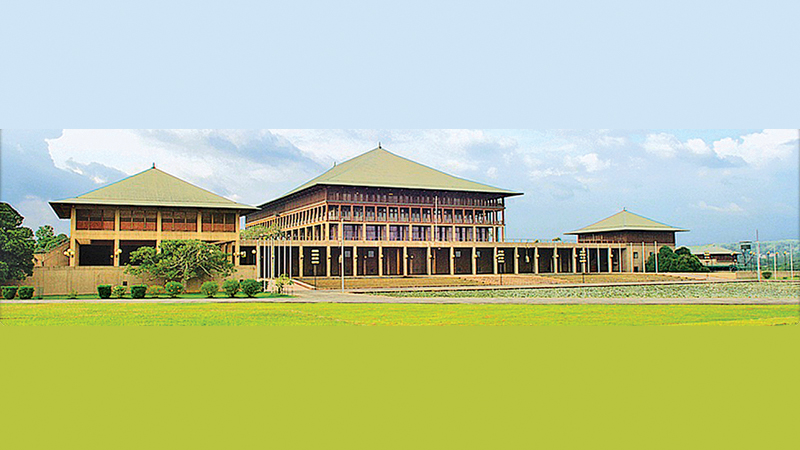 Sri Lanka is gearing up for its most decisive General Election. President Anura Kumara Dissanayake’s election as President has caused a major shift in the status quo with the old guard politicians announcing their retirement from politics in the face of growing unpopularity. In the midst of all of this, we have fresh faces yearning for a chance to lead the country. Most of the hopefuls were part of the Aragalaya in 2022, now they are contesting the November poll to be part of the 17th Parliament. We carry below some information about their background and their clamour to enter mainstream politics.
Sri Lanka is gearing up for its most decisive General Election. President Anura Kumara Dissanayake’s election as President has caused a major shift in the status quo with the old guard politicians announcing their retirement from politics in the face of growing unpopularity. In the midst of all of this, we have fresh faces yearning for a chance to lead the country. Most of the hopefuls were part of the Aragalaya in 2022, now they are contesting the November poll to be part of the 17th Parliament. We carry below some information about their background and their clamour to enter mainstream politics.
****
I stand for the right to an affordable meal”
Prof. Ajantha Perera
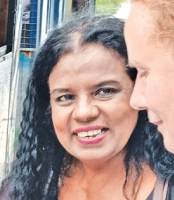 Prof. Ajantha Perera was forthright in her comments. She contested the 2019 Presidential Election, finishing seventh with over 27,500 votes. She contested the 2020 parliamentary election representing the UNP in the Colombo District but failed to get elected.
Prof. Ajantha Perera was forthright in her comments. She contested the 2019 Presidential Election, finishing seventh with over 27,500 votes. She contested the 2020 parliamentary election representing the UNP in the Colombo District but failed to get elected.
Known affectionately as the ‘Garbage Queen’ for her environmental activism, Prof. Perera has also lobbied extensively for civil rights and economic equality. In 2022, she dropped out of politics to take part in the Aragalaya.
Today, she is back in the game and running for Parliament as an Independent candidate under the symbol of a loaf of bread for the Colombo District. Armed with a bundle of hastily printed handbills she went on a door-to-door campaign with her friends in Dehiwala last Monday (14). “A loaf of bread for a hundred rupees,” she said every time she handed a flier. “Bread is a staple diet. I stand for the right to an affordable meal,” she added.
True to her nickname, she didn’t hesitate to wade through puddles, dodge the rain and tiptoe past debris strewn across the railroad tracks to talk to constituents. Prof. Perera and her friends also didn’t shy away from praying for some people. When asked about the outward display of faith, she said that she stands for family, religion and economic development.
“There are some who are attempting to bring laws such as legalising gay marriage, lesbianism and allowing 16-year-olds to turn into prostitutes. This is not part of the Sri Lankan culture. We have a culture that lays emphasis to the family unit,” she said. Prof. Perera said she doesn’t believe in political revenge. “People are expecting someone to punish wrongdoers and put them behind bars. Yes, we need to punish them but not out of revenge but to get back the money they stole”. She said Parliament is not a place to fight but for healing. “This is a place where we look at one another and work together, we need to give results; it’s not for locking people up, it’s all about changing lives”, she added.
****
Inclusion key to creating a system that ensures equality for every citizen”
Chanu Nimesha
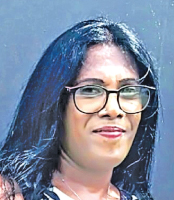 Fighting for the rights of marginalised communities, Chanu Nimesha, a quantity surveyor by profession, is contesting under the Sri Lanka Socialist Party banner for the Kegalle District this year. We found her busy at work, overseeing an upcoming apartment complex in Nugegoda. She is also the first transgender person to contest a Sri Lankan election.
Fighting for the rights of marginalised communities, Chanu Nimesha, a quantity surveyor by profession, is contesting under the Sri Lanka Socialist Party banner for the Kegalle District this year. We found her busy at work, overseeing an upcoming apartment complex in Nugegoda. She is also the first transgender person to contest a Sri Lankan election.
Chanu said she fights for the rights of marginalised communities in Sri Lanka and views the rise of President Dissanayake and the NPP as a continuity of the Aragalaya. “I have leftist roots. I was born in a home that also functioned as a JVP organising office,” she said.
Two years ago, Nimesha was an active member at the ‘Gota Go Gama’. She endured baton charges and still bears a scar from a tear gas canister that hit her shin.
LGBTQ persons make up eight percent of Sri Lanka’s population and of that, one percent is transgender but no party wants to give any representation to this community, she said. “Unfortunately, I wasn’t given a platform by the NPP or leftist groups such as the Frontline Socialist Party, but was given a place in the Social Party”. However, she said she does not mind working with the NPP if elected to Parliament.
According to Nimesha, inclusion is the key to social transformation, not just economic reform. “Pluralistic representation in an economy is what actually brings about social transformation. What we wanted in the Aragalaya is to create a political system that ensures equality for every citizen”.
She also advocates equitable solutions such as cooperatives that will eliminate middlemen and help farmers to sell their produce at a fair price. In terms of urban planning, Nimesha said that development should be on the same footing in all zones and a network of railroads and highways connecting cities will ensure more economic opportunities for people outside of Colombo.
Change, she said, is only possible when the current system of cronyism is done away with and that progressive people like herself will be the replacement that brings about true change.
****
Permanent change comes through struggles kept alive by the people”
Swasthika Arulingam
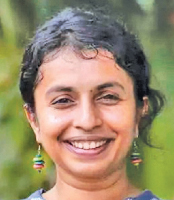 Swasthika Arulingam is a human rights lawyer and activist who played a major role in the Aragalaya. She is representing the People’s Struggle Alliance (PSA) in the Colombo District.
Swasthika Arulingam is a human rights lawyer and activist who played a major role in the Aragalaya. She is representing the People’s Struggle Alliance (PSA) in the Colombo District.
The PSA has been part of many struggles such as student, farmer, fishers and worker struggles but these voices have not been heard in Parliament since MPs had been acting on behalf of the political and business elite, she said.
“There are many laws and policies which the previous Government passed such as the Online Safety Act, Central Bank Act and Economic Transformation Act. All of these Acts are against the interest of Sri Lanka and economic and political sovereignty of Sri Lanka, so we want to enter Parliament to push for radical policy changes within the spaces of Government”.
Even though they will become part of Parliament which is part of the formal state structure, Arulingam is confident that her party will not succumb to corruption like so many political Movements before them.
“I am part of the trade Union Movement. When I go to Parliament, I won’t detach myself from the people I represent. I’m very much connected to their political interests”.
Given the general aversion to the Left, we asked why her party accommodates Marxist ideas.
Marxism is more of a way of analysis, a way of thinking through things and a way of strategising, she said.
Arulingum said that Leftist ideas of social justice, universal healthcare and education, affordable housing, food and decent wage were made mainstream in the Aragalaya and are no longer unpopular as neoliberal advocates try to portray.
She said permanent change only comes through struggles kept alive by the citizenry and that Parliament has a very limited role. “We are going there to do that limited role. But if we want permanent change, a real system change, people must constantly engage in pushing for that change”.
****
I don’t think the NPP can deliver the system change demanded by the Aragalaya”
Prasad Welikumbura
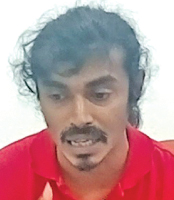 Prasad Welikumbura is representing the United Socialist Party (USP) in the Colombo District. The USP is part of the Committee for a Workers’ International and is contesting in four districts. We found Welikumbura at a USP meeting discussing the upcoming poll with his comrades. Although they are aware of constraints, they made plans to campaign within their means.
Prasad Welikumbura is representing the United Socialist Party (USP) in the Colombo District. The USP is part of the Committee for a Workers’ International and is contesting in four districts. We found Welikumbura at a USP meeting discussing the upcoming poll with his comrades. Although they are aware of constraints, they made plans to campaign within their means.
“We are a small party but have a history going back to 1989 and we are ideologically strong,” he said adding that leftism is becoming popular as the neoliberal experiment is failing around the world; not just in the global south but also in North America and Europe. “People think that President Anura Kumara Dissanayake is a Leftist and the international media called him a ‘Marxist President’ but we don’t see him going down the Leftist road. He has pledged to follow the IMF program and just two days ago decided to reconsider the Adani wind power project which he said he won’t do”.
Welikumbura said there had been a clear distinction between the Left and Right, but the National People’s Power (NPP) brought both together in a centre platform. “After the election we see a clear setback for the leftist camp, indicating that the NPP is on a right-wing path”.
“We are still seriously in debt. Most of the money Sri Lanka borrowed wasn’t used to benefit the people but it instead went forwhite elephant projects, while the rest was pocketed. For example, our hospitals were seriously unequipped to function during the Covid-19 pandemic”. With regard to the Aragalaya, Welikumbura said the NPP was dragging its feet in the beginning, preferring at first to keep a distance from what they saw as a ‘leaderless movement’ but later taking active part in the struggle.
“The Aragalaya was a truly revolutionary movement and the NPP benefited from the popular support that came after it. But I don’t believe they can create that system change that was demanded when I see the ideological differences between the left-right camps within the NPP”, he said.






